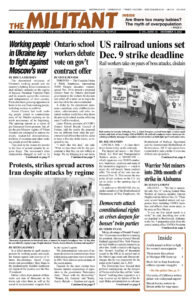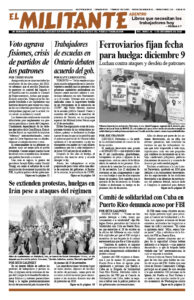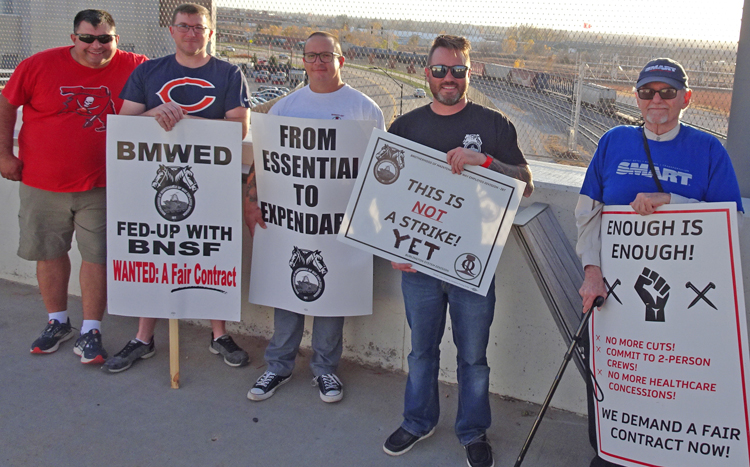LINCOLN, Neb. — A class showdown looms today on the railroads.
The largest rail union — the Sheet Metal, Air, Rail and Transportation Workers union, or SMART-TD — which organizes over 30,000 conductors, brakemen, yardmen and some of the locomotive engineers — voted to reject the rail bosses’ latest contract offer. The result of the vote was announced Nov. 21. This means the majority of rail workers in the U.S. are set to strike in the opening days of December.
In addition to SMART-TD, this includes members of the Brotherhood of Maintenance of Way Employees, the Brotherhood of Railway Signalmen and the International Brotherhood of Boilermakers. All 12 rail unions have committed to join a strike if even one of them sets up pickets.
This is the result of years of abuse by the rail bosses, for whom the drive for profits means workers have to suffer on-call schedules, ever smaller crews doing more and more work, dangerous working conditions, draconian absentee policies and lack of paid sick leave.
They also face the notoriously anti-labor Railway Labor Act. Passed in 1926 to weaken rail workers, it wraps rail union negotiations in a labyrinth of federal government restrictions, including handing Congress the ability to halt any rail strike and impose a settlement workers have already voted down.
This makes a growing number of rail workers interested in the current battle by school workers, members of the Canadian Union of Public Employees, in Ontario. On Nov. 4 they defied the government and went on strike despite a draconian anti-strike bill passed a day earlier that barred them from striking, mandated crippling fines on every single worker as well as their union if they went ahead and set up picket lines and imposed the bosses’ contract offer on them.
Two rail union workers here, SMART-TD conductor Lance Anton and Jakob Forsgren, a welder, track repair worker and chair of local Lodge 1320 of the Brotherhood of Maintenance of Way Employees, told the Militant Nov. 19 they’ve started collecting signatures from their union brothers and sisters to send a message of solidarity to CUPE after hearing about their strike and ongoing solidarity actions with their continuing fight.
Their message reads:
“We are United States railroad workers in operating and rail craft unions that work on the railroad in and near Lincoln, Nebraska. The undersigned are sending our solidarity and admiration to education and other workers in your fight against Canada’s anti-labor laws, fighting for a livable wage, and funding for schools. We need to emulate your struggle here as we are fighting the railroad employers and federal government that use the anti-labor Railway Labor Act to tie our unions up in red tape against going on strike to get a contract that gives workers and our families a quality of life that includes a livable wage and safe working conditions.”
They hope their effort will bring to the attention of fellow rail workers that when the bosses and their government tell workers they can’t do something, it’s simply not true. When the government in Ontario told school workers they couldn’t strike, they did so anyway. After just two days the government agreed to rescind the law, drop all threatened fines and restart negotiations.
This shows that what workers can or can’t do reflects the class relationship of forces, not what some law says. After all, it’s just a piece of paper.
Fight against gov’t strikebreaking
In 1947 the U.S. government passed the Taft-Hartley Act in the midst of the postwar strike wave. This bill, called the “slave labor bill” by unionists, was used over the next 12 months by “friend of labor” President Harry Truman against workers on the West Coast docks, on the railroads, packinghouses and others. The law authorized the president to obtain court injunctions declaring strikes illegal and ordering “cooling off” periods.
But many unionists reacted like the school workers in Canada. When the bill was passed, some 212,000 outraged coal miners walked out of the pits across the country. “Let the Senators dig the coal,” was their battle cry and they won a 44-cent hourly wage increase.
Workers in both the U.S. and Canada have faced years of anti-labor laws that target our unions and our right to strike. According to the Canadian Foundation of Labour Rights, the federal government in Ottawa and provincial governments across Canada passed 230 pieces of legislation since 1982 that have restricted, suspended or denied collective bargaining rights for Canadian workers.
Rail unions prepare for a strike
After SMART-TD announced its contract vote, the Brotherhood of Maintenance of Way Employees issued a statement Nov. 21. “Over 55% of Railroad Workers have made it very clear that the tentative national agreements are not satisfactory settlements for the workforce. The most common sticking point … has been the lack of quality-of-life improvements,” especially for the BMWE, “paid sick leave.”
But, the union says, “the railroads have made it clear that they will neither engage in any meaningful discussions nor accept any sort of proposal regarding such.”
“It is our belief that railroad management simply seeks to punish their employees for attempting to exercise their democratic rights to reject a tentative agreement and engage in collective action to gain paid sick time off,” the BMWE, which organizes 23,000 rail workers, said. “They do not want this campaign to succeed because it would prove that solidarity works.”
Congress is now on a Thanksgiving holiday break through Nov. 29. Members of the U. S. Senate Commerce Committee have indicated they are “prepared once again to bring this matter to the floor” to push legislation that would force the rail unions to accept a contract in the interest of the rail bosses.
Bosses of all stripes — industry associations, agribusiness, shippers and others — are calling for the Biden administration and Congress to act. Now is the time for members of the rail unions to reach out to fellow workers and their unions, and to the many working people living in rural towns and working farmers to explain rail workers’ situation and ask for their active support.
Lance Anton, Jakob Forsgren and this Militant correspondent have been invited to the Dec. 2-3 Nebraska Farmers Union annual convention in Lincoln to discuss with working farmers what rail workers face. We hope to learn about the crisis affecting working farmers as they try to survive under drought conditions, crushing debt, and the skyrocketing cost of farmland and production.
We are all allies in the fight against the bosses, the capitalist system and their government.
Joe Swanson is a retired member of SMART-TD.


